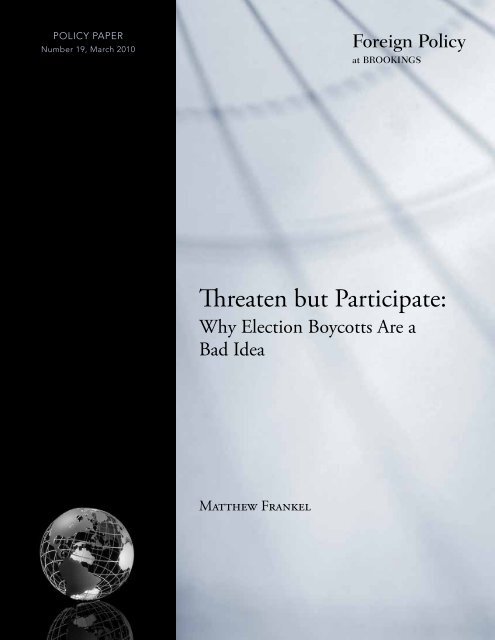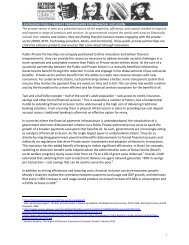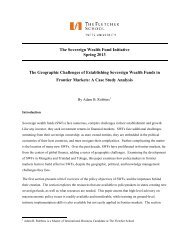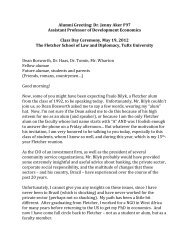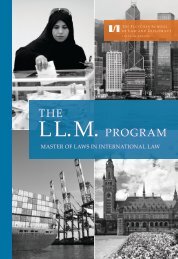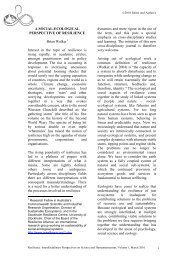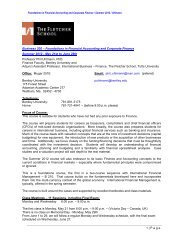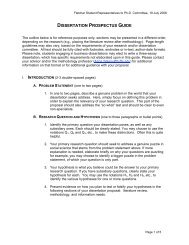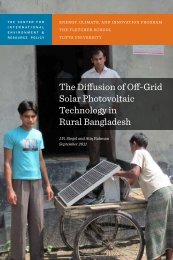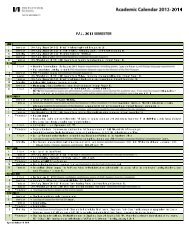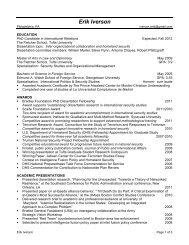Threaten but Participate: - Brookings Institution
Threaten but Participate: - Brookings Institution
Threaten but Participate: - Brookings Institution
Create successful ePaper yourself
Turn your PDF publications into a flip-book with our unique Google optimized e-Paper software.
POLICY PAPERNumber 19, March 2010Foreign Policyat BROOKINGS<strong>Threaten</strong> <strong>but</strong> <strong>Participate</strong>:Why Election Boycotts Are aBad IdeaMatthew Frankel
POLICY PAPERNumber 19, March 2010Foreign Policyat BROOKINGS<strong>Threaten</strong> <strong>but</strong> <strong>Participate</strong>:Why Election Boycotts Are aBad IdeaMatthew Frankel
A c k n o w l e d g e m e n t sThe author would like to thank Ted Piccone, DeputyDirector for Foreign Policy at <strong>Brookings</strong>; Carina Perelli,Executive Vice President of the International Foundationfor Electoral Systems; and Eric Bjornlund, co-founder andprincipal of Democracy International for their helpful commentson this paper.<strong>Threaten</strong> <strong>but</strong> <strong>Participate</strong>: Why Election Boycotts Are a Bad IdeaF o r e i g n P o l i c y a t B r o o k i n g sii
T h r e at e n <strong>but</strong> Par t i c i pat e: WhyE l e c t i o n Boycotts are a Bad IdeaFor a while, the run-up to the 2010 generalelections in Iraq appeared to be déjà vu all overagain. The National Dialogue Front (NDF),a key Sunni political party, had decided to pull outof the election to protest the disqualification of hundredsof candidates—most notably their leader, Salahal-Mutlaq—for alleged ties to the banned Ba’th Party.At the last minute, the NDF walked back from thebrink and decided to participate, hopefully signalinga growing understanding that election boycotts rarelysucceed. The Iraqi Sunnis know this better thanmost, having learned this lesson the hard way just fiveyears ago.The Sunni community’s decision not to participatein the historic elections of January 2005 is nowviewed as one of the great strategic blunders of thepost-Saddam era. Claiming anti-Sunni bias fromboth the Shia parties and the Coalition ProvisionalAuthority, and declaring that legitimate electionscould not take place under occupation, major Sunnigroups such as the Association of Muslim Scholars,the Iraqi Islamic Party, and the Iraqi Federation ofTribes decided to boycott the election. These groupsinitially tried to use the threat of a boycott to secureconcessions, such as the elimination of a single-constituencystructure for the voting that would benefitShia or the establishment of a timetable for UnitedStates withdrawal, <strong>but</strong> none of these came to fruition.Unsurprisingly, the Sunni parties were mauled in theelections, earning only five of 275 parliamentary seats,leaving them out in the cold during the key formativemonths in the new Iraq. The boycott also deprivedthem of a fair share in the constitutional draftingprocess, and without adequate representation in Parliament,the Sunnis were unable to prevent the newconstitution from passing. Potential revisions to thedocument remain one of the key sticking points betweenIraqi Sunni and Shia. To their credit, the Sunnisquickly saw the error of their ways and participated inthe December 2005 elections, upping their representationin the Parliament eleven-fold to 55 seats, <strong>but</strong>sectarian tensions remain.The Iraqi example is illustrative of the thesis of thispaper: electoral boycotts rarely work, and the boycottingparty almost always ends up worse off thanbefore; a threatened boycott, on the other hand, canpay dividends, especially in high-profile cases. Inshort, you can’t win if you don’t participate. A comprehensivestudy of 171 threatened and actual electionboycotts at the national level between 1990 and2009 demonstrates conclusively that, other than afew rare exceptions, electoral boycotts generally havedisastrous consequences for the boycotting party,rarely result in desired international attention orsanction, and many times further entrench the rulingleader or party. On the flip side, the track recordis considerably better when a threatened boycott isused as negotiating leverage to achieve key concessions;sometimes, opposition parties that planned toboycott even find unexpected benefits from participatingin elections.Why Boycott?Before demonstrating the litany of negative consequencesfrom electoral boycotts, it is important to<strong>Threaten</strong> <strong>but</strong> <strong>Participate</strong>: Why Election Boycotts Are a Bad IdeaF o r e i g n P o l i c y a t B r o o k i n g s1
understand why parties choose to boycott electionsin the first place. The electoral boycott has becomea regular tool for political opposition parties to use,especially since the end of the Cold War. With therise of new democracies in Eastern Europe, LatinAmerica, and Africa, an increase in contested electionsalso has brought with it an increase in decisionsto boycott. Whereas only four percent of allelections worldwide were boycotted in 1989, thatnumber had risen to 15 percent by 2002. In the decade1995-2004, an average of nearly 10 electionsper year was boycotted. (chart) Although the numbershave declined since 2004, possibly in recognitionof the futility of the endeavor, boycotts remainfirmly on the radar of opposition parties planningelectoral strategies. The fact that some Sunnis wereeven contemplating boycotting this year’s electionsdespite the nearly-universal recognition that theirboycott five years earlier was an unmitigated disasterreflects this point.In the vast majority of cases, the boycotting partyprotests perceived electoral unfairness. This canrange from the lack of an independent electoralcommission to rules that favor the incumbent partyto the use of appointed, rather than electorally contestedseats in the legislature. In virtually all cases,the opposition believes that the system inherentlyand unfairly benefits the ruling party. The goal ofthe protesting party is either to get the ruling partyto level the electoral playing field or to focus the internationalcommunity’s attention on the unfair orfraudulent practices of the ruling regime and delegitimizeits international standing.Historically, however, this study demonstrates that,with the exception of very high-profile cases, boycottingparties receive little support from the internationalcommunity. For example, in Ethiopia, oppositionparties boycotted the 1994 parliamentaryelections despite appeals from aid donors and Ethiopia’sallies in the west. 1 The ruling Ethiopian PeoplesRevolutionary Democratic Front won a landslidevictory, taking 484 of 547 seats in an election thatwas quickly recognized and supported by the UnitedStates. 2 The Ghanaian opposition decided to boycottthe 1992 parliamentary elections to protest the reelectionof Jerry Rawlings as president earlier thatyear in what was referred to as the “Stolen Verdict.” 3Boycotts and <strong>Threaten</strong>ed Boycotts1990-20096050403020101990-94 1995-99 2000-04 2005-090<strong>Threaten</strong> <strong>but</strong> <strong>Participate</strong>: Why Election Boycotts Are a Bad IdeaF o r e i g n P o l i c y a t B r o o k i n g s2
They wanted a fresh presidential election and assumedthat the international attention from the boycottwould garner enough condemnation to make ithappen. As it turned out, the opposition was wrongon all counts, no new election was held, Rawlingsremained president until 2001, and his party took189 of 200 parliamentary seats in the 1992 electionthanks to the ill-advised boycott.The opposition in Mali boycotted the 1997 generalelections, claiming that the government of AlphaOumar Konare had committed massive fraud.Konare was easily re-elected and his ruling party took123 of 147 seats in the legislature. Although therewere claims of irregularities and a reported turnoutof less than ten percent in the election, the UnitedStates recognized the results, with Secretary of StateMadeleine Albright later referring to Mali as a relativebastion of democracy in West Africa. 4 Similarly,the Azerbaijani opposition boycotted the 2003 presidentialelections claiming election irregularities, leadingto a convincing win for Ilham Aliyev, the son oflongtime president Heydar Aliyev. Despite the boycottand weeks of post-election protests, the UnitedStates recognized the result of the election.Threats Can Be EffectiveEthiopia, Mali, Ghana, and Azerbaijan are hardly pivotalcountries on the world scene, so elections in thosecountries usually don’t garner the international attentionnecessary to allow the boycotting parties to gainsome benefits. In countries with greater geo-strategicrelevance, however, the threat of a boycott can actuallybe a strong negotiating tactic. Although history demonstratesthat ruling parties should not fear electoralboycotts, intense international attention on an electionoften entices the party in charge to make concessionsthat can end up being costly. The best exampleof this dynamic was the landmark 1994 elections inSouth Africa, the first of the post-apartheid era.While it was clear that Nelson Mandela’s African NationalCongress (ANC) would gain a decisive majority,Mandela was under both domestic and internationalpressure to ensure that the elections were fullyrepresentative. The constant thorn in his side wasMangosuthu Buthelezi, the Zulu head of the InkathaParty and leading figure of the KwaZulu Natal regionof South Africa. Fearing ANC repression, Butheleziwanted KwaZulu recognized as a separate homeland,and threatened a boycott to achieve his demands.While Buthelezi didn’t gain an independent homeland,he did receive two significant concessions. Thefirst was the removal of a single ballot system, whichwould have treated all votes the same, regardless ofwhere they were cast. And the second was the authorizationof a constitutional change to give moreregional autonomy to KwaZulu within South Africa.Buoyed by these gains, Buthelezi chose to participate,and immediately reaped the benefits of these concessions.Although Inkatha only received 6.2 percent ofthe vote nationwide, it handily defeated the ANCwithin KwaZulu itself, giving Buthelezi considerablepower. While an actual boycott would probably havespelled the end for Buthelezi, leveraging the boycottthreat earned him a prominent position in the postapartheidSouth Africa that he was then able to parlayinto earning the number two slot on the ANCticket for the 1999 elections.South Africa is not the only example of significantconcessions earned by threatening boycotts. In thefirst post-Dayton Peace Accord election in Bosnia,Muslims and Croats threatened to boycott unlessBosnian Serb leader Radovan Karadzic, a notoriouswar criminal, was barred from running for thepresidency. As in the South Africa case, the internationalcommunity desperately needed a fully representativeelection and pressured the Bosnian Serbsto force Karadzic to step down. In the 1998 Cambodianparliamentary elections, four oppositionparties threatened boycott unless Prince NorodomRanariddh, who had been ousted in a 1997 coup,was allowed to participate. The new Hun Sen regimewas anxious to demonstrate its legitimacy to the internationalcommunity in order to undo the suspensionof World Bank and IMF loans imposed afterthe coup and convince ASEAN to induct Cambodiainto its ranks, and so Ranarridh was allowed toreturn. The vote was split nearly evenly between theruling party and the opposition, and the subsequentpower sharing agreement included naming Ranarridhas the parliamentary speaker.<strong>Threaten</strong> <strong>but</strong> <strong>Participate</strong>: Why Election Boycotts Are a Bad IdeaF o r e i g n P o l i c y a t B r o o k i n g s3
A History of Disastrous BoycottsAlthough threatened boycotts in high-profile electionscan pay dividends, the results of the studyindicate that actual boycotts almost always end infailure. In addition to removing the boycotting partyfrom any governmental role, they also result in oneor more of three major negative outcomes: marginalizationof the boycotting group, further empowermentof the existing ruler and his party, and unexpectednegative changes to election dynamics. Let’sexamine these three results in turn.Marginalizing the OppositionFirst is the marginalization of the boycotting group.This is a common result because the boycott itselfmeans that the opposition party is willfully removingitself from periodic competition for political power.In many developing countries, control of the governmentand its ministries means control of vital outletsfor patronage. Choosing not to participate thus relegatesthe group to the position of vocal oppositionwithout influence in the competition for scarce stateresources. Without means of patronage to provide,the opposition is forced to rely on popular discontentwith the ruling regime as its mobilizing cry. The marginalizationis enhanced when international supportfails to materialize, as outlined above.The decision not to participate can often create frustrationand damaging internal tension. In 1996,the Zambian opposition United National IndependenceParty (UNIP), headed by Kenneth Kuanda,decided to boycott the general elections. The UNIPclaimied that the government of Frederick Chiluba—whodefeated Kuanda in the 1991 electionafter leveraging a threatened boycott to change theelectoral system—was using improper electoral registrationlists. The decision was met with less thanuniversal approval, especially from the 26 existingUNIP MPs, who would not be allowed to stand fortheir own seats in the election. Chiluba was easilyre-elected, his party took 125 of 157 parliamentaryseats, giving him a supermajority for the first time,and the boycott “pushed the UNIP to the vergeof political extinction,” from which it has yet torecover. 5 Similarly, the United Democratic Party(UDP) in Gambia fell into complete disarray afterboycotting the 2002 parliamentary elections overclaims of irregularity in the 2001 presidential campaign.As a result, the ruling party won nearly twothirdsof the legislative races unopposed and endedup with 50 of the 53 overall seats.The opposition to Zimbabwean president RobertMugabe also fractured over boycott discussionsin 2005. That year, the opposition Movement forDemocratic Change (MDC) lost 16 seats in the parliamentaryelections—in part because dithering overa possible boycott kept MDC registration numbersdown. Following that setback, MDC leader MorganTsvangarai made the fateful decision to boycottthe elections for the newly-created Senate, claimingthat this body would be a rubber stamp for Mugabe.Not surprisingly, this created tension within theMDC as a sizable faction believed that choosingnot to participate would be a fateful error. The partysplintered, Tsvangarai lost his mandate, and the rulingZANU-PF party captured 49 of 66 seats in theSenate election against the fractured opposition. Tsvangaraiwas able to patch things up by choosingto participate in the 2008 elections—resulting innear-parity in seats between the ZANU-PF and theMDC—<strong>but</strong> he undercut himself in the presidentialelection. In the first round, Tsvangarai actuallyoutpaced Mugabe, <strong>but</strong> the government claimed thathe fell short of the 50 percent threshold necessaryto avoid a runoff. In protest, Tsvangarai decided toboycott the runoff election, allowing Mugabe to triumphhandily, turning victory into setback. Whilethe eventual power-sharing deal gave the MDC anunprecedented stake in the government, Tsvangarai’sboycott allowed Mugabe to retain the top governmentalposition.Nor is Zimbabwe the only case where a boycott canturn a projected victory into a defeat. Three oppositionparties in Cameroon decided to boycott the1997 presidential elections, despite the fact that theparties combined had captured 56 percent of theparliamentary vote just five years earlier. But, stillsmarting over incumbent president Paul Biya’s narrowand disputed victory in 1992, the opposition<strong>Threaten</strong> <strong>but</strong> <strong>Participate</strong>: Why Election Boycotts Are a Bad IdeaF o r e i g n P o l i c y a t B r o o k i n g s4
chose not to compete against him in 1997. As aresult, Biya was re-elected in a landslide, garneringover 92 percent of the vote with a turnout of over 60percent and remains president to this day.Sometimes, the fracturing of an opposition groupover electoral boycotts creates even more dire outcomes.Take the case of the 1997 parliamentaryelections in Serbia. By the time these elections wereheld, Serbia had already experienced five-plus yearsof devastating war with neighboring Bosnia andCroatia under Slobodan Milosevic. The opposition,led by Vuk Draskovic and Belgrade mayor ZoranDjindjic, was on the rise. It seemed clear that a unifiedopposition would defeat Milosevic and end hisreign of terror. But the key actors couldn’t agree.Originally, the opposition agreed to boycott, <strong>but</strong>Draskovic wanted to ensure his party had representationso he changed his tune, claiming the boycottwas orchestrated merely to injure his faction. 6 Theremainder of the opposition, under the leadershipof Djindjic, refused to participate, even though theirparticipation likely would have given the oppositiona majority. Instead, Milosevic and his allies wonthe partially boycotted election and retained power.This result was quickly recognized by the oppositionas a tremendous gaffe. “Milosevic is still in powerbecause the opposition has missed so many opportunities,”lamented Democratic Party official SlobadanVuksanovic, just one month before Milosevic’s repressiveactions in Kosovo drew Serbia into a costlywar with NATO. 7Finally, opposition leaders can be marginalizedthrough non-participation just as easily as parties.In 1997, Kenneth Matiba, head of the largest oppositionparty in Kenya and loser in a relatively close1992 presidential race to Daniel arap Moi, decidedto boycott the presidential election to protest Moi’sunfair political system. Moi handily won re-electionover lesser candidate Mwei Kibaki and Matibaquickly fell into political obscurity. Ostracized by hisSaba Saba party, Matiba was forced to found his ownsplinter party, which never gained traction. In the2007 presidential elections, Matiba placed a distantseventh with a grand total of 8,046 votes, comparedto earning 1.5 million votes 15 years earlier.Political maneuvering in Afghanistan has yieldedcomparable results. Abdosattar Sirat was one of themore popular figures at the 2001 Bonn Conferenceestablished to create the new Afghan government.In the final reckoning, however, he lost out when theUnited States decided to throw its full support behindHamid Karzai. Still smarting from that rebuke, Siratorchestrated an opposition boycott of the 2004 election,claiming that Karzai’s rule was fraudulent andillegitimate. But, the boycott—which was supposedto include all 14 opposition candidates—quickly fellapart, and Karzai won re-election with 55 percentof the vote. Sirat was discredited, resigned as JusticeMinister, and has faded into political obscurity. Althoughit is too soon to know for sure, this couldalso be the fate for Abdullah Abdullah, who repeatedSirat’s mistake in the tumultuous 2009 presidentialelection, withdrawing from the runoff and therebyhanding Karzai his re-election on a silver platter.Empowering IncumbentsIn addition to the negative effects on the boycottingparty, electoral boycotts often have the unintendedconsequence of strengthening the incumbent rulerand providing him and his party with a more powerfulmandate to lead. The absence of opposition fromthe race frees the playing field for the ruling party toobtain a supermajority, allowing it to take unrestrictedaction including invoking constitutional change.Perhaps the best example of this is in Venezuela,where a series of ill-conceived electoral boycotts bythe opposition from 2004-05 merely served to cementPresident Hugo Chavez in power. The 2004boycotts of regional elections gave Chavistas 20 of 22governorships nationwide. In 2005, four leading oppositionparties, which held 41 Congressional seatsat the time, decided to boycott in protest of Chavez’sheavyhanded rule, leading to a governmental sweepof all seats. As a result, Chavez had the backing topass new legislation to strengthen his powers, includingthe removal of presidential term limits, and hehas since won additional electoral contests.In Togo, the opposition party Union of Forces forChange boycotted the 2002 parliamentary electionsin protest of unfair election laws. As a result of the<strong>Threaten</strong> <strong>but</strong> <strong>Participate</strong>: Why Election Boycotts Are a Bad IdeaF o r e i g n P o l i c y a t B r o o k i n g s5
oycott, the ruling Rally of the Togolese People partywon 90 percent of the seats in the elections andused its supermajority to change the constitution toremove presidential term limits. President GnassingbeEyadema also was able to pass two controversialamendments to ease the eventual transition of powerto his son. 8 Similar cases took place in both Ethiopiaand Peru in 1992 and in each case the oppositionwas left without recourse for action since they voluntarilyeschewed parliamentary representation.Unexpected Electoral ImplicationsIn a number of cases in this study, the electoral boycottcreated blowback by changing electoral dynamicsin unexpected ways. In these cases, the boycottsallowed parties that would have otherwise lost to triumphor enabled new actors to fill the electoral void.The best example of the latter case is the 1992 parliamentaryelections in Lebanon, when the MaroniteChristians boycotted to protest Syrian involvementin the country. Their absence from the election—Christians previously had representational paritywith Muslims in the 128-member assembly—onlyserved to strengthen pro-Syrian forces. The mostnotable of these was a nascent radical Shia Islamicgroup known as Hizballah, now the most prominentpolitical force in the country. Hizballah earned 16seats, gaining a foothold in the political system, andNabih Berre, the leader of the Hizballah-affiliatedmovement Amal, was named house speaker. 9In 1993, the Pakistani ethnic minority group MohajirQaumi Movement (MQM), which held 15of 217 parliamentary seats, decided to boycott theparliamentary elections to protest harassment of itscandidates by army and police forces. But their decisionnot to participate opened the door for BenazairBhutto, whose party had been guilty of repressionof the MQM, to edge past Nawaz Sharif’s party,traditionally more sympathetic to the MQM, andgain a majority. Had the MQM participated, Sharifalmost certainly would have come out on top. 10Similar dynamics played out in two other electionswhere the boycotting party was a militant groupwith a pseudo-political wing. The results were nobetter. In 2000, the Basque ETA militant group andits political wing called for a boycott of the elections.Low turnout in Basque areas probably helped enablethe election of Jose Maria Aznar to the position ofprime minister. Aznar, whose party was the biggestadversary of Basque nationalism, was the first ConservativePrime Minister in Spain since GeneralissimoFrancisco Franco’s death in 1975. In 2005, theTamil Tigers called for a boycott of the Sri Lankanelection as part of their demands for greater autonomy.They enforced the boycott through violent coercion,greatly limiting turnout in Tamil-dominatedareas. As a result, Ranil Wickramasinghe, who wasmore sympathetic to the Tamil cause, was narrowlydefeated by hardliner Mahindra Rajapakse. Followingthe election, the hardline government took atougher stance against the Tamil Tigers, setting inplace operations that would result in the eventualdefeat of the militant group.The ramifications of the final case are still playing outtoday in Iran. In the run-up to the 2005 presidentialelection, the reformists, who lost their majority inthe Majlis in 2004 in a partially-boycotted election,threatened a boycott to protest the removal of theircandidates from the ballot. Iran’s Guardian Councilconceded on this point, reinstating prominentreformists Mustafa Moin and Muhsin Mehralizadehto the ballot. But some elements of the reformmovement, especially students, continued to protestthe actions of the regime and called for a boycott.In the end, the reformists got the worst of bothworlds. Moin, Mehralizadeh and current reformistleader Mahdi Karrubi ended up splitting the votesof those reformists that chose to participate, meaningthat all three lost out to Ali Akbar al-Rafsanjaniand Mahmud Ahmadinejad. Notably, Karrubi fellonly 600,000 votes short of Ahmadinejad in the firstround and would have clearly surpassed the hardlinerif either the boycotting students turned out enmasse to vote or if Moin, who received four millionvotes, was not returned to the ballot.Sometimes Participation WorksThe above cases demonstrate the multitude of possiblenegative ramifications of electoral boycotts, <strong>but</strong><strong>Threaten</strong> <strong>but</strong> <strong>Participate</strong>: Why Election Boycotts Are a Bad IdeaF o r e i g n P o l i c y a t B r o o k i n g s6
there is also one potential positive effect of choosingnot to boycott: your party might actually exceedexpectations in elections. The 1997 Albanian parliamentaryelections illustrate this point as well as thepotential benefits of a threatened boycott. A threatenedSocialist boycott forced Sali Berisha’s governmentto make changes to a controversial new electionlaw. The Socialists then chose to participate andwent on to defeat the ruling Democratic Party inthe elections. Berisha, deprived of his parliamentarymajority, stepped down a month later. Tsvangarai’sMDC also reaped the rewards of participation in the2000 general elections in Zimbabwe. Learning theirlessons from the ill-conceived 1995 boycott that resultedin Mugabe’s party winning 117 of the 120contested seats, the MDC chose to participate inthe 2000 general elections. At the time, Tsvangaraiclaimed that a boycott would “play into Mugabe’shands,” and extend ZANU-PF rule indefinitely. 11 Inthe 2000 election, the MDC won 57 seats, just fivefewer than the ZANU-PF.One political group that seems to have learnedfrom past boycotts and benefitted from participationis the Islamist political parties in the MiddleEast. These parties are generally looked on suspiciouslyby the leaders of conservative authoritarianregimes, who have historically sought to limit theirrise. In Bahrain, the Shia Islamic National AccordAssociation (INAA) decided to boycott the landmark2002 legislative elections—the first since theking dissolved the parliament in 1975—because theking had also created a second legislative body thatwould be wholly appointed by him. As a result ofthe boycott, the legislature was split between secularistsand Sunni Islamists with the Shia Islamists onthe outside looking in. This imbalance was correctedin 2006, when the INAA not only participated, <strong>but</strong>took 18 of 40 seats, beating out both the Sunni Islamists(12) and secular independents (10).Islamists in Jordan reaped similar benefits fromchoosing to participate after previous damagingboycotts. In 1997, the Islamic Action Front was thelargest opposition grouping in the Jordanian parliament,holding 16 of 80 seats. Nevertheless, it choseto boycott the elections that year in protest of achange in the election laws that would benefit triballeaders at its expense. The results, unsurprisingly,served only to reduce Islamist influence in the legislature.By 2000, only five of the 80 seats were heldby Islamists, compared to almost one-third of thebody in 1991. The IAF regretted the decision, realizingthat its influence had been lost in the government,negatively affecting its popularity in formerstrongholds. 12 Seeing the error of its ways, the IAFdecided to participate in the 2003 elections, despitethe fact that the election law had not been changed.This time, the IAF earned 17 seats, making themonce again the largest oppositionist party and demonstratingthe benefits of participation.Dealing with Authoritarian RegimesFor opposition parties facing authoritarian regimes,the choice of whether to participate in orboycott an election is akin to deciding whether tohit or stand in blackjack when holding 16 against aface card; neither option is likely to end in success.If the opposition party decides to participate, it ishighly unlikely that it will win, given the high levelsof fraud and fear that often accompany electionsin these countries. Additionally, opposition participationserves to legitimize the election for the outsideworld, regardless of how fairly it is conducted.On the other hand, choosing to boycott guaranteeselection victory to the ruling party, further entrenchingit in place. The boycott might removethe veneer of democratic legitimacy of the rulingregime, <strong>but</strong> as we have seen, it doesn’t change thefacts on the ground. Staffan Lindberg’s study ofauthoritarian parties in Africa indicates that theirchance of success depends on making it to the secondelection. 13 Once the regime is over that hurdle,it is often clear sailing. This phenomenon arguesstrongly for opposition participation, at least in thefirst round of elections.This dynamic has been observed in a number ofAfrican countries over the past two decades, mostnotably Burkina Faso, Chad, Djibouti, EquatorialGuinea, Cote d’Ivoire Togo, and Tunisia. The patternplays out like this. The opposition protests thegovernment’s authoritarian tendencies and claims the<strong>Threaten</strong> <strong>but</strong> <strong>Participate</strong>: Why Election Boycotts Are a Bad IdeaF o r e i g n P o l i c y a t B r o o k i n g s7
electoral process is unfair. They choose to boycott inprotest because they don’t want to legitimize the rulingregime. But, the absence of any opposition servesonly to return the ruler and his party to power by largermargins. So, we have Blaise Compaore, president ofBurkina Faso since 1987, Idriss Deby, ruler of Chadsince 1991, and Zine El Abidine Ben Ali, presidentof Tunisia since 1987. The mild exception seems tobe Cote d’Ivoire, where the pattern began familiarly,with Henri Bedie’s re-election to the presidency withover 90 percent of the vote in 1995, thanks to an oppositionboycott. But, then things turned off course.Bedie was overthrown in a 1999 military coup by retiredgeneral Robert Guei. New elections were held,and Laurent Gbagbo of the opposition, who hadboycotted the 1995 elections, upset Guei in a 2000election and assumed the presidency. Gbagbo wasaided in gaining a parliamentary majority later thatyear by the boycott of another oppositionist, AllesaneOuattara. The ongoing conflict between Gbagbo andOuattara was a primary cause of the civil war in Coted’Ivoire, which lasted from 2002 to 2004.In these situations, there are no clear good optionsfor opposition parties <strong>but</strong> election boycotts are certainlynot one of them. They have not produced regimechange, and whatever international outrage isstirred up in these remote locations seems to haveminimal effect. However, given few good alternatives,it is reasonable to expect the pattern of fruitlessboycotts to continue, unless international pressurecan be stepped up to the point of having a meaningfulimpact.When Boycotts Can WorkOf the 171 cases examined for this study, a smallminority (roughly four percent) resulted in positiveoutcomes for the boycotting parties. These cases fellinto two very different categories: cases where theopposition party had considerable popular supportand the boycott was merely one piece of a largeropposition campaign that could mobilize streetprotests, strikes and other forms of civil unrest,and cases where electoral laws required quorums toproceed. There have been successes in both categories,<strong>but</strong> the former cases bring the risk of militaryintervention while the latter cases risk blowback tothe boycotting party for being obstructionist.There are three cases that fit into the first camp—Bangladesh in 1996, Peru in 2000-01, and Thailandin 2006-07. In all three cases, the boycotting partyhad considerable public support and a number of additionalweapons at its disposal. In Bangladesh, theopposition Awami League and its allies decided toboycott the February 1996 parliamentary election,demanding that Prime Minister Khaleda Zia resign.The boycott call was accompanied by mass protestsand general strikes, which basically shut the countrydown two days before the election. Facing no opposition,Zia’s BNP took 205 of 207 seats in an electionwith exceptionally low turnout. However, continuedprotests and strikes led Zia to agree grudgingly to anotherset of elections, to be held under a caretakergovernment two months later. This time, Awamichose to participate and earned 147 of 299 seats(compared to 116 for the BNP) in the new voting.In 2000, after years of ruling Peru by underminingdemocratic institutions, it appeared that incumbentPresident Alberto Fujimori had finally met his matchin charismatic opposition leader Alejandro Toledo.Despite leading in the polls, Toledo lost to Fujimoriin the first round of an election marred by claimsof massive fraud. Since Fujimori didn’t cross the 50percent threshold, a second round was required, <strong>but</strong>Toledo chose to boycott to protest both the fraudulentfirst round and the lack of objectivity of the electoralcommission. Without opposition, Fujimori triumphedeasily in the runoff, <strong>but</strong> Toledo claimed that“the president can declare himself the winner, <strong>but</strong> hisgovernment will lack credibility and legitimacy.” 14Toledo then pulled upon his reservoir of support,tapping into the anger at Fujimori’s fraud toorganize massive peaceful demonstrations to protestthe election results. The international community,led by the Organization of American States, alsoplayed a supporting role in this case by refusing tovalidate Fujimori’s elections and spearheading anelectoral observation mission. The ongoing pressureresulted in Fujimori’s sudden decision to resign sixmonths later under allegations of corruption. An<strong>Threaten</strong> <strong>but</strong> <strong>Participate</strong>: Why Election Boycotts Are a Bad IdeaF o r e i g n P o l i c y a t B r o o k i n g s8
interim government oversaw new elections in 2001,and Toledo defeated Alan Garcia to become the newPeruvian president. As with Bangladesh, the boycottwas just one piece of the puzzle; the ability to mobilizestrong anti-governmental support was the keyfactor in the eventual regime change.In 2006, embattled Thai Prime Minister ThaksinShinawatra called for parliamentary elections to beheld within 60 days, three years ahead of schedule,as a way to break a governmental impasse. The opposition,angered that Thaksin was planning to usethese elections as a makeshift referendum, protestedand chose to boycott despite holding 96 of 500seats. Thanks to the boycott, Thaksin’s party won458 seats in the election, <strong>but</strong> as in Bangladesh andPeru, popular support was on the side of the opposition.Massive protests and demonstrations led toThaksin’s decision to step down two days after theelections. The courts then nullified the elections andcalled for new elections to be held under the controlof a caretaker government.But even the Bangladesh and Thailand cases werenot clear-cut victories, as post-boycott events servedto move both countries away from democracy. Inthe Thai case, the military filled the void five monthsafter the nullified elections and took power in abloodless coup. It would be another 15 months beforeany elections were held. The Bangladeshi exampleis more complicated. Awami’s boycott allowed itto take power in 1996, <strong>but</strong> the BNP returned to thethrone in 2002, leading to another standoff aheadof the planned 2007 elections. Returning to their1996 model, Awami organized massive protests andstrikes, <strong>but</strong> this time the military finally stepped in,ruling the country as a “caretaker government” undera state of emergency throughout 2007 and 2008.The second scenario in which boycotts can be effectiveis what I refer to as “quorum boycotts.” In thesecases, the country’s president must be appointedby two-thirds of the legislative body, so oppositioncoalition decisions to boycott these elections canprevent the attainment of a quorum and nullify theelections. The boycotts are successful in these casesbecause they operate under strict constitutionalguidelines. Whereas a president in a general electioncan win a boycotted election even when turnout is25 percent or less, in the quorum cases, the boycottcan bring the proceedings to a standstill.The Moldovan opposition utilized this tactic in 2000to prevent a Communist candidate from earning thepresidency. Four attempts at an election were heldand all four failed due to a lack of quorum. Finally,new parliamentary elections were held in 2001, andthe Communists gained enough seats to push theircandidate through. The opposition tried again in2005, after earning 45 of 101 seats in that year’s parliamentaryelections. Once again, the boycott nullifiedseveral attempts to pick a president, althoughthis time, one of the opposition parties negotiatedwith the Communists to support their candidate inexchange for action on several key laws.There are dangers in this approach as well, despitesome successes. Although taking the obstinatestance can yield benefits in negotiations, the publicmay not have the stomach for extended delaysand obfuscations, especially when there is not astrong anti-incumbent outcry. In these cases, theboycotting party can end up getting burned. Takethe Republican People’s Party (CHP) in Turkey. Asecular party, the CHP objected to Prime MinisterErdogan’s appointment of Islamist Abdullah Gul asa presidential candidate. The CHP’s boycott left theparliament ten votes short of the required numberto elect him, leading to three failed attempts andfinally new parliamentary elections. But, when theelections were held, the CHP took a pounding, fallingfrom 178 seats to 112. Most of the seats werelost to a new nationalist party that then made a dealwith Erdogan’s party to support Gul’s candidacy.ImplicationsThe results of this study hold profound lessons forboth ruling and opposition parties, as well as theinternational community in terms of the decisionmaking surrounding electoral boycotts. From theperspective of the opposition party, it is clear thatelectoral boycotts are rarely the correct strategy, unlessthe opposition has widespread public support andpersistence to remove the ruling regime. In the vast<strong>Threaten</strong> <strong>but</strong> <strong>Participate</strong>: Why Election Boycotts Are a Bad IdeaF o r e i g n P o l i c y a t B r o o k i n g s9
majority of cases, if the opposition chooses to participate,they will at least have some stake in thesystem; if they boycott, they will be on the outsidelooking in and history has demonstrated thatthe international cavalry is rarely willing or able toride over the hill and save them. Opposition partieswould be better served focusing on other electoralstrategies, including building coalitions, trying tocreate a unified front to prevent harmful infighting,and in more high-profile cases, employing the threatof a boycott to earn electoral concessions or someform of power-sharing agreement.The calculus is different for the ruling party, whoseonly goal is to return to power with as much legitimacyas possible. Ruling parties have generallyresponded to boycotts or boycott threats in one ofthree ways: ignore or belittle them, crack down onboycotters, or negotiate a settlement. The primaryresponse of the ruling party has been to downplaythe electoral boycott, often citing high turnoutnumbers and claiming that the opposition partieshad decided to boycott to save face because theywere going to lose anyway. During the 1995 Haitianelection, senior government officials explained theopposition’s boycott this way, claiming “They haveno popular support; they boycott because they knowthey will lose.” 15 Hugo Chavez gave a similar explanationregarding the Venezuelan opposition boycottin 2005, stating that the opposition “should acceptthe truth that they have no public. It’s an attempt atpolitical sabotage.” 16In high-profile elections, ruling parties will likelyfeel greater pressure to negotiate <strong>but</strong> the recordshows that even then, they should be wary aboutgiving away too much for the sake of oppositionparticipation. Zambia in 1991, South Africa in1994, and Cambodia in 1998 are all evidence ofthat. In these cases, the party in power will have towalk a fine line in order to enable even a boycottedelection to appear legitimate, often by hypingturnout numbers and emphasizing that they did allthey could to bring a recalcitrant opposition partyto the table.More heavy-handed techniques by theruling party, such as arresting individuals that callfor boycotts, as has been done in Honduras andRussia, are unnecessary and foolish. If the goal isto make the elections seem as legitimate as possible,it is counterproductive to institute furthercrackdowns to prevent behavior—an electoral boycott—thatwill probably only serve to strengthenthe incumbent regime.The historical lack of successful boycotts also createsa dilemma for the international community as itwrestles with the question of whether internationalstability or the promotion of democracy throughfree and fair elections is a larger priority. Traditionally,the United States and international organizationshave encouraged the broadest possible participationin elections in order to make them as representativeas possible. The goal therefore should be to encourageparties not to boycott. But if there is a boycott ina reasonably fair election, the international communitybecomes torn between recognizing the potentiallylegitimate grievances of the boycotters whilestill validating the elections that took place. Onepotential solution is to increase international monitoringof elections in order to reduce fraud and thusencourage broader participation. The problem withthat course is that, according to a 2009 study, thepresence of international monitors actually increasesthe probability of an electoral boycott. 17So what is the international community to do?There are three areas that should be focused on inorder to have the most positive impact.Encourage broad participation. The top priority,given the abysmal track record of boycotting parties,is to continue to encourage the broadest participationpossible in order to avoid the calamitousoutcomes of Venezuela, Lebanon, Iraq, Serbia andothers. It will be impossible to adequately address allperceived grievances, <strong>but</strong> all efforts should be madeto discourage boycotts, even when confronting authoritarianregimes.Apply public pressure. The international communityneeds to use its bully pulpit, whenever possible,to condemn countries that are democracies in nameonly in the hopes that fear of international isolationor the loss of international aid will allow for fairer<strong>Threaten</strong> <strong>but</strong> <strong>Participate</strong>: Why Election Boycotts Are a Bad IdeaF o r e i g n P o l i c y a t B r o o k i n g s10
electoral systems. One major caveat here is that theUnited States and others must be willing to back upthese threats; in numerous cases fair elections havetaken a back seat to stability, especially in regards toour allies in the fight against global extremism.Act rapidly. Given that authoritarian regimes entrenchover time, it is important to engage as quicklyas possible, especially during periods of political transition.Once an authoritarian leader has been electedand re-elected, it is often too late to have meaningfulimpact. The call for rapid action also dovetails nicelywith encouraging broad participation. Given thelogistical preparations necessary to hold elections,opposition parties must be goaded into participationas early as possible to avoid missing registrationwindows or harming electoral chances. Too often,opposition parties come to the decision to participatetoo late to achieve the full effect. The threat ofa boycott can pay dividends <strong>but</strong> the opposition partiesstill have to participate in order to receive thefull benefits. Choosing to sit out is almost always alosing proposition.(Endnotes)1“Ruling Party Triumphs in Ethiopian Election,” The Guardian (London), 4 July 1994.2“Ethiopia: Thumbs-up from Washington,” The Indian Ocean Newsletter, 27 August 1994.3“Ghana: A Tale of Two Elections,” Africa News, 8 February 2008.4Africa Research Bulletin, 1 October 1999.5“Long Awaited UNIP National Council May Be A Flop,” Africa News, 11 May 1999.6Tanjug news agency, Belgrade, in English 0950 gmt 4 August 1997.7“Milosevic Advantage: In Talking Peace He Can Win Big,” New York Times, 2 February 1999, p. A7.8Piccone, Ted and Richard Young. Strategies for Democratic Change. Washington, DC: Democracy Coalition Project, 2006. p. 51.9“Militant Hezbollah Now Works Within The Lebanese System,” Los Angeles Times, 22 February 1993, p. A7.10“Bhutto Seeks To Form Pakistani Coalition Government,” Los Angeles Times, 8 October 1993, p. A5.11“Zimbabwe Teachers Now Targets,” Christian Science Monitor, 11 May 2000.12“Islamic Action Front to Take Part in Municipal Elections,” Jordan Times, 3 March 1999.13Lindberg, Staffan. “When Do Opposition Parties Boycott Elections?” April 2004. p.6.14“Insurgent in Peru Calls for Electoral Boycott,” New York Times, 20 May 2000, p. A6.15Pastor, Robert. “Mediating Elections”, Journal of Democracy, vol 9. No. 1 (1998). p. 160.16“Venezuela opposition parties pull out of congressional elections,” Associated Press, 29 Nov. 2005.17Beaulieu, Emily and Susan Hyde, “In the Shadow of Democracy Promotion”, Comparative Political Studies, Vol. 42, March 2009.<strong>Threaten</strong> <strong>but</strong> <strong>Participate</strong>: Why Election Boycotts Are a Bad IdeaF o r e i g n P o l i c y a t B r o o k i n g s11
A b o u t the AuthorMatthew Frankel is a Federal Executive Fellow at the <strong>Brookings</strong> <strong>Institution</strong>.He has had a distinguished career as a senior analyst working on Iraq,and has authored numerous papers on a variety of Iraq-related issues includingmilitants, Iraqi tribes, and the role of neighboring countries. Mr. Frankelreceived his B.A. in international relations from Tufts University and mastersof international law and diplomacy from the Fletcher School in 1996.<strong>Threaten</strong> <strong>but</strong> <strong>Participate</strong>: Why Election Boycotts Are a Bad IdeaF o r e i g n P o l i c y a t B r o o k i n g s12
The <strong>Brookings</strong> <strong>Institution</strong>1775 Massachusetts Ave., NWWashington, D.C. 20036brookings.edu


